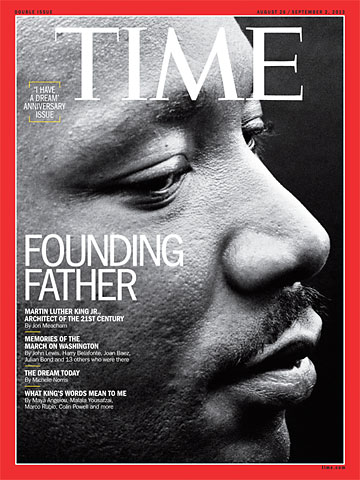
(5 of 6)
It's a tragic irony of American history that a people enslaved by white men finally became equal before the law not because of the nonviolent courage of millions of people of color but because of the murder of a single white man. The horror of the bombing of the 16th Street Baptist Church in Birmingham, Ala., on Sept. 15, 1963--an attack executed by Klansmen that killed four young girls--loomed large in the national consciousness, particularly when the violence of the crime was contrasted with the nonviolence of the March on Washington. Yet there is no escaping the fact that the moral case King made before the nation in August 1963 was given legislative force only after the assassination of Kennedy in Dallas three months later elevated Johnson to the presidency. The passage of the landmark bills of 1964 and 1965 was possible because LBJ was determined--but a determined realist. "Even if we pass this bill, the battle will not be over," he said after Selma in March 1965 as he proposed voting-rights legislation.
It would, though, be a battle won. From the Brown school-desegregation decisions in 1954 and 1955 through the Great Society bills of the mid-1960s, Jim Crow was fatally wounded--so much so that the phrase is now anachronistic. Long-term research cited by Stanford's Gavin Wright shows that educational integration in the South has produced positive economic results for African Americans, including increases in "graduation rates, test scores, earnings and adult health status, while reducing the probability of incarceration."
That's the good news. "One generation removed from the civil rights movement, we went from a country where a majority of the people believe in racial hierarchy, believed in the idea that there was one type of person who was fully deserving of citizenship, to a country where a majority of people reject that idea," says Sheryll Cashin, a Georgetown law professor and former clerk for Supreme Court Justice Thurgood Marshall. "Because of the civil rights movement, we became a country where a majority of people really embrace the idea of equality as an American ideal. It's seen as un-American to be discriminatory or racist. That's a major achievement, despite the fact that we still have inequality."
A LEGACY AT RISK
In a new report, the national Urban League is using the mark of 50 years since the march to measure the state of black America. In terms of education, the league notes that the high school completion gap has closed by 57 points, the number of African Americans in college has tripled, and there are now five college graduates for every one in 1963. When it comes to standards of living, the percentage of African Americans living in poverty has fallen 23 points (the figure for black children is 22%), and homeownership among blacks has increased 14%.
